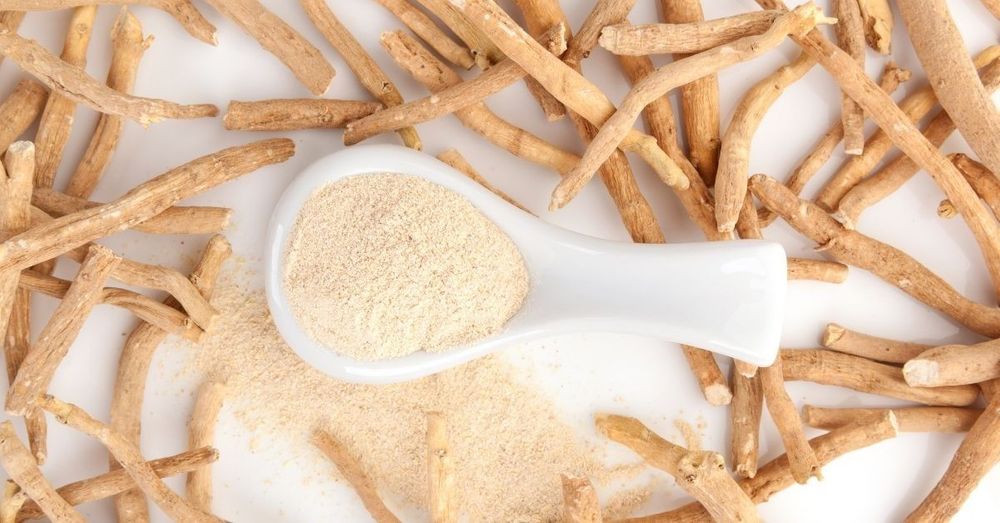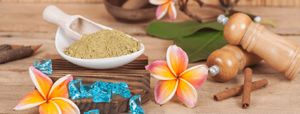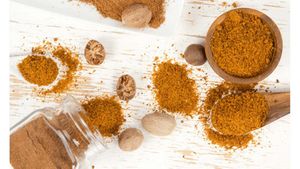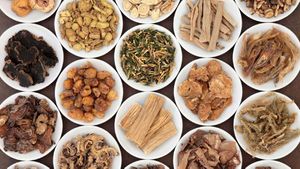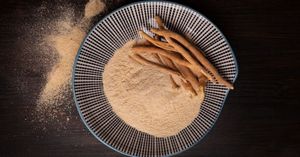Withania somnifera (Ashwagandha) is an evergreen plant native to India, the Middle East, Western China, and Africa. Ashwagandha, commonly known as "Indian winter cherry" or "Indian Ginseng," is a herb utilised in Ayurvedic medicine in India for several health benefits.
This article will provide you with all the information you need about Ashwagandha benefits for men, one of the most effective Ayurvedic herbs.
What Is Ashwagandha?
Ashwagandha (Withania somnifera), the evergreen shrub, grows throughout India. It has been used in traditional medicine for a long time. Ashwagandha’s roots and orange-red fruits have been used for medicinal purposes for hundreds of years. The herb is also known as Indian ginseng and winter cherry. The name "ashwagandha," which means "smell of a horse," refers to the fragrance of the root.
Ashwagandha is used for stress-related illnesses because it is an adaptogen. As a study suggests, Insomnia, ageing, anxiety, and other illnesses are among the conditions for which it is prescribed. There is scientific evidence to back up most of these claims.
Ashwagandha Benefits for Men
1. Relieves Stress and Anxiety
Perhaps the most well-known benefit of ashwagandha is its ability to relieve stress. Several studies have demonstrated ashwagandha's ability to reduce participants' stress and anxiety levels significantly.
As evidenced by one study, ashwagandha can also improve sleep quality—researchers confirmed participants slept much better when given the herb rather than a placebo.
2. Increased Fertility
Ashwagandha may aid in male fertility. According to studies, ashwagandha improves both sperm count and motility (movement) in men who are infertile.
Another study found similar results, showing that ashwagandha can significantly improve sperm count and motility. However, more research is needed to confirm these results.
3. Lowers Blood Sugar and Fat
A couple of small clinical studies found ashwagandha to be beneficial in lowering blood glucose and triglyceride levels (the most common type of fat in the blood). One study likened ashwagandha’s blood sugar-lowering effects to those of medications prescribed for type 2 diabetes.
4. Increases Muscle and Strength
Researchers are still investigating the effectiveness of ashwagandha in increasing strength and muscle size. Participants in one study reported increased speed and strength. Another study found that when ashwagandha was consumed, it increased muscle power while also lowering body fat percentage and cholesterol levels. Some participants reported improved sleep, but this study did not compare ashwagandha consumption to a placebo.
Another study with only male participants found that ashwagandha treatments were effective. Men who received ashwagandha saw significant gains in muscle strength (measured using bench press and leg extension exercises), muscle size in their arms and chests, and a significant reduction in body fat percentage and post-workout muscle damage when compared to the placebo group.
5. Boosts Fertility and Testosterone Levels in Men
For men, ashwagandha may have reproductive benefits. By rebalancing reproductive hormone levels, ashwagandha has been shown to improve sperm quality in infertile men significantly. One study found that 14% of male patients' partners became pregnant after the study.
Separately, in an ashwagandha stress study, researchers discovered that the herb increased testosterone levels in male but not female participants. Another study on the effect of ashwagandha on muscle strength in men found a significant increase in testosterone.
6. Treats Erectile Dysfunction
Ashwagandha is frequently promoted as a treatment for erectile dysfunction (ED), which is defined as the inability to obtain or maintain an erection.
While there is compelling anecdotal evidence, the science is lacking. There have been very few studies on the use of ashwagandha in the treatment of ED. Existing research does not show much promise for this application of the herb.
One study attempted to use ashwagandha to treat psychogenic erectile dysfunction, a type of ED associated with sexual performance concerns and sexual anxiety. According to the findings, ashwagandha provided no relief.
Another follow-up study confirmed the same findings that ashwagandha seems to offer no benefit in treating ED.
7. Sharpens Focus and Memory
Ashwagandha may aid in the improvement of cognition, memory, and the ability to perform motor responses following instructions. Small studies have found that ashwagandha significantly improved participants' reaction times during cognition and psychomotor tests when compared to a placebo (which measures the ability to respond to instructions and perform an indicated action).
A study found that ashwagandha significantly improved participants' attention spans, as well as their immediate and general memory.
8. Supports Heart Health
At least two studies have found that ashwagandha can boost VO2 max levels, which is the maximum amount of oxygen you can take in while exercising. These levels are used to assess cardiorespiratory endurance, or how well the heart and lungs deliver oxygen to muscles during exercise. Higher VO2 max levels can thus indicate a healthy heart that performs well under those conditions.
However, since this study was conducted with only healthy, athletic adults, its results may not be applicable to all populations.
9. Reduce inflammation
Ashwagandha contains compounds, such as WA, that may aid in the reduction of inflammation in the body.
WA has been discovered to target inflammatory pathways in the body, including signal molecules known as nuclear factor kappa B (NF-B) and nuclear factor erythroid 2-related factor 2 (NF-ERF2) (Nrf2).
WA has been shown in animal studies to help reduce levels of inflammatory proteins such as interleukin-10 (IL-10)
According to some evidence, Ashwagandha may also help reduce inflammatory markers in humans.
Adults experiencing stress were given ashwagandha extract for 60 days in one 2008 study. As a result, they had significantly lower levels of C-reactive protein, an inflammatory marker, when compared to those who received a placebo.
In another study, people with COVID-19 were given an Ayurvedic drug containing 0.5 grammes of ashwagandha and other herbs twice daily for 7 days. When compared to a placebo, this reduced participants' levels of inflammatory markers CRP, IL-6, and TNF-.
10. Help Improve Sleep
Many people use ashwagandha to promote restful sleep, and there is some evidence that it may help with sleep problems.
For example, a study of 50 adults aged 65 to 80 discovered that taking 600 mg of ashwagandha root per day for 12 weeks significantly improved sleep quality and mental alertness upon waking compared to placebo treatment.
Furthermore, one meta-analysis of five high-quality studies discovered that ashwagandha had a small but significant positive effect on overall sleep quality.
Taking ashwagandha helped people feel less anxious and more alert when they woke up.
The results were more pronounced in people with insomnia and those who took more than 600 mg daily for 8 weeks or longer, according to the researchers.
11. Safe and Widely Available
Although the long-term effects of ashwagandha are unknown, it is a safe supplement for most people.
According to a review of 69 studies, ashwagandha root appears to be safe and effective for managing certain health conditions such as stress, anxiety, and insomnia.
One study of 80 healthy men and women found that taking 600 mg of ashwagandha daily for 8 weeks was safe and had no negative health effects.
12. May Lessen the Symptoms of Some Mental Health Issues
Some evidence suggests that in certain populations, ashwagandha may help reduce symptoms of other mental health conditions, including depression.
Researchers examined the effects of ashwagandha on 66 people with schizophrenia who were experiencing depression and anxiety in one study.
They discovered that taking 1,000 mg of ashwagandha extract daily for 12 weeks reduced depression and anxiety more than taking a placebo.
Furthermore, another study suggests that ashwagandha supplementation may help improve total symptoms and perceived stress in people with schizophrenia.
13. Benefits Athletic Performance
According to research, ashwagandha may improve athletic performance and be a beneficial supplement for athletes.
One study included 12 studies in men and women who took ashwagandha doses ranging from 120 mg to 1,250 mg per day. The findings suggest that the herb may improve physical performance, such as strength and oxygen use during exercise.
An examination of five studies revealed that ashwagandha significantly increased maximum oxygen consumption (VO2 max) in healthy adults and athletes.
14. Improve Overall Health and Well-Being
One possible reason why ashwagandha improves overall health and well-being is that it reduces stress levels. Stress can have a negative impact on one's overall health and well-being. Ashwagandha relieves stress, which can improve overall health and well-being.
15. Reduce Body Fat Percentage
Ashwagandha has the potential to help reduce body fat percentage in a number of ways. One method is to reduce stress, which can help prevent the accumulation of belly fat. Another way it can help is by improving metabolic health, which allows the body to metabolise food more efficiently.
16. Eases Joint Stiffness
Inflammation is the most common underlying cause of both everyday aches and pains and chronic conditions such as osteoarthritis. According to studies, the herb reduces swelling, pain, and even promotes mobility.
17. Reduces Cortisol Levels
High cortisol levels increase the risk of a variety of health problems, including hypertension, stroke, and even poor mental health. Because of its ability to regulate cortisol production, ashwagandha has been used for many years.
18. Improves Bone Health
Ashwagandha is an important herb for bone health. It promotes healthy bone calcification by increasing the number of cells that produce bone tissue. It also reduces inflammation, making the environment more conducive to bone healing.
19. Supports Gut Health
Ashwagandha and gut health are inextricably linked. The herb not only reduces stomach acid, but it also promotes healthy digestion by regulating epinephrine, norepinephrine, and cortisol levels.
20. Supports Healthy Cholesterol Levels
According to studies, ashwagandha may help lower total cholesterol and bad cholesterol (LDL). It also reduces triglyceride levels, which raises the risk of heart disease and other cardiovascular problems.
21. Detoxifies the Body
Toxins enter the body through food, the environment, topical products, and other factors. By boosting liver function and supporting detoxifying enzymes, ashwagandha aids in the removal of toxins and other harmful compounds.
22. Increases Sperm Count
Ashwagandha improves desire in males; therefore, it's only logical that sperm counts will increase. In a study, a group of men was given ashwagandha pills for 90 days throughout that time. The results revealed that men who took ashwagandha pills had a 167 per cent increase in sperm count. In men with low sperm counts, it enhanced sperm concentration and motility
23. Acts as a Pain Reliever
Contrary to popular opinion, Ashwagandha is not a cure for arthritis. Instead, it acts as a pain reliever. Taking Ashwagandha also prevents the transmission of pain signals to the central nervous system. It may also help with pain due to its anti-inflammatory properties.
When treating rheumatoid arthritis, research conducted in 2015 found that Ashwagandha effectively treats the same
How to Take Ashwagandha
Ashwagandha uses for males are backed by multiple scientific researches. But to get maximum benefits from Ashwagandha, you must know when and how to take Ashwagandha.
Ashwagandha roots and berries can be ingested for medicinal purposes. It is found in supplement capsules, tablets, powder, tincture, and tea form. Starting with an ashwagandha tea is the right way to ease into the herb and help with hydration.
Add the raw form of ashwagandha or an ashwagandha powder directly to your food if you want to get more creative. You can use the powder in nut butter, granola, smoothies, and overnight oats. You can gain ashwagandha Churna benefits for males in the form of a delicious ashwagandha latte with cinnamon and almond milk.
Although it is generally considered a safe plant, as with any herbal supplement, you should consult your naturopath or health practitioner to discuss your specific needs. Standard root extract capsules (500–1000 mg daily) are the best alternative for a therapeutic dosage.
Also Read: Dosages of Ashwagandha | How to take Ashwagandha
How Is Ashwagandha Used As Medicine?
In case you didn’t already know, all parts of the Ashwagandha plant are exceedingly helpful. One can use Ashwagandha leaves to prepare herbal tea, for example. Although these leaves are bitter to taste, they have immense amounts of iron that can relieve anaemia or an iron deficiency among men.
Moreover, Ashwagandha flowers have diuretic properties and serve as natural aphrodisiacs that boost sexual energy and desire. Ashwagandha seeds can destroy parasitic worms in the body.
Herbal concoctions and tonics like Ashwagandharishta treat anxiety, loss of memory and stress among men.
Ashwagandha Side Effects for Men
Although there are no known adverse effects from taking modest to medium quantities of the plant daily, more than 2g of ashwagandha per day, on the other hand, can upset your stomach and cause diarrhoea or vomiting. Although Ashwagandha male benefits are assured, the improper dosage of ashwagandha is the most common cause of side effects.
The Ashwagandha side effects for men, according to Consumer Lab, were headaches, drowsiness, and stomach trouble. They further mention that ashwagandha may help to improve blood pressure and blood sugar levels while also increasing thyroid hormone levels.
Some may feel hotter after consuming it due to its healing properties. This can be reduced by taking it during the day, particularly with food.
Side effects of Ashwagandha on males can increase if you have diabetes, a thyroid issue, or an autoimmune disease like rheumatoid arthritis. In such cases, you should avoid using ashwagandha.
Summing Up on Ashwagandha Benefits for Men
Ashwagandha has traditionally been used to treat male problems. One of the ashwagandha benefits in men is its capacity to boost and control testosterone production in the body.
Ashwagandha has been shown to boost and maintain healthy male fertility levels in men with poor sperm count and mobility.
The Withanolides in ashwagandha boosts sperm count by about 167 per cent in a recent study of individuals with low sperm counts. Also, increase in the quality of sperm and antioxidant levels.
It's no surprise that the herb worked in almost all cases of stress-related infertility in a study of men aged 22 to 45. It even assisted some of the individuals in conceiving successfully with their partners.
If you're thinking about using ashwagandha to improve your fertility, talk to your doctor first. In addition to avoiding Ashwagandha side effects, stick to the advised dosage for men.
FAQS
Is Ashwagandha a Viagra?
No, Ashwagandha is not a viagra. Ashwagandha, known as Indian ginseng, is a versatile herb. Ginsenoside, contained in ginseng, has the same effect on the body as Viagra. The herb has demonstrated a considerable improvement in erection onset and maintenance. You can treat erectile dysfunction and libido loss with Ashwagandha.
Does Ashwagandha Make You Last Longer in Bed?
Yes, Ashwagandha can help you last longer in bed. It can help with poor libido, erectile dysfunction, sex drive, stress reduction, and testosterone production. It has aphrodisiac properties. Furthermore, research has shown that Ashwagandha can help with sex endurance.
Is Ashwagandha Good for Male Enhancement?
Since the time of the Kama Sutra, Ashwagandha benefits men's health and their sex lives. Not only has the plant been described in one of the oldest pieces of literature on sexuality, but mounting evidence in modern science is also pointing in that direction.
Ashwagandha can help reduce stress levels. When stress levels are high, blood pressure rises as well. High blood pressure restricts blood flow to all arteries, making it one of the primary causes of impotence.
Ashwagandha is known to increase testosterone levels. The production of testosterone in men's bodies drops as they age. Ashwagandha is known to improve sexual desire in males.
Does Ashwagandha Increase Size?
While there are numerous Ashwagandha penile benefits, such as raising male libido and sex drive, acting as a natural aphrodisiac, and enhancing male sexual desire, there is no scientific evidence that Ashwagandha for penis growth or enlargement works.
How Many Days Will It Take for Ashwagandha to Start Working?
When combined with a healthy lifestyle, ashwagandha can positively impact the body in two weeks. However, it may take a few months to detect or even experience significant changes depending on your health. The most important factor is the quality of your ashwagandha supplement. When used in conjunction with other healthy behaviours, Ashwagandha supplements can help nourish your body.
Can Ashwagandha Cause Erectile Dysfunction?
The Ashwagandha does not appear to have much potential in treating ED. The goal of one study was to see if ashwagandha could help with psychogenic erectile dysfunction. A kind of ED that is linked to concerns about sexual performance and sexual anxiety. Ashwagandha did not provide any assistance, according to the findings. Another study verified the same findings, namely that ashwagandha appears to have little benefit in the treatment of ED.
Is Ashwagandha a Steroid?
No, Ashwagandha is not a steroid. It's worth noting that ashwagandha is generally well tolerated and has a range of potential health advantages. Withanolides, steroids found naturally in nightshades, are responsible for their adaptogenic health effects.
Is 1000 Mg of Ashwagandha Too Much?
No. There is no standard or suggested dosage for ashwagandha. It is widely accepted that a daily dose of root powder should be between 1,000 and 6,000 mg. A daily dose of 500 mg to 1,500 mg is recommended if you’re taking an extract. Each dose should contain at least 6 mg of withanolides, a critical marker ingredient in the herb supplement that can impact how it works.
Can Ashwagandha Increase Testosterone?
Yes, Aswagandha can increase testosterone. A prior study looked at its effects on sperm quality in infertile men. The individuals' testosterone levels increased by 10–22% after ingesting 5 grams each day for three months. In addition, 14 percent of participants' partners became pregnant. Another study found that ashwagandha boosts testosterone levels while improving exercise performance, strength, and fat reduction. Furthermore, small research of 57 men found that ingesting 600 mg of ashwagandha extract for 8 weeks boosted testosterone levels by approximately 15% over a placebo.
Can We Take Ashwagandha Daily?
Yes, taking ashwagandha daily is safe. Ideally, the best time to take an ashwagandha supplement is after food. It should not be taken in higher doses or for longer than recommended.
Who Should Not Take Ashwagandha?
Although Ashwagandha root benefits for men in multiple ways, avoid this Ayurvedic herb if you already have a high temperature because it is difficult to digest. Fever weakens you and interferes with the functions of other organs. If you take Ashwagandha during this period, your stomach may be unable to digest it, resulting in diarrhoea and other health issues. Those who have medical diseases such as diabetes, high or low blood pressure, stomach ulcers, autoimmune illness, or thyroid issues should avoid using ashwagandha.
Which Is the Best Ashwagandha Powder or Capsule?
There is no specific ashwagandha powder or capsule that can be considered the best as it depends on the quality of the brands and the dosage. You should consult your doctor before consuming Ashwagandha, and they can prescribe you a suitable powder or capsule as per your needs.
How Much Ashwagandha Should I Take for Erectile Dysfunction?
Ashwagandha is an aphrodisiac that can be taken daily as a tablet or powder. The standard ashwagandha dosage for erectile dysfunction is 300-500mg per day. Ashwagandha powder for erectile dysfunction is taken as a supplement, blended in water or any other consumable liquid.
If you're unsure how much ashwagandha to take for erectile dysfunction, you should speak with a doctor.
Ideally, a dose of Ashwagandha is
- Ashwagandha 1 tablet twice a day
- Ashwagandha 1 capsule twice a day
- Ashwagandha churna 1/4-1/2 teaspoon twice a day.
Do I Take Ashwagandha in the Morning or Night?
As Ashwagandha is a multifaceted herb, it can be consumed both in the morning or at night. However, due to its sleep-enhancing and anxiety-relieving properties, it is best consumed before bed.
What are Ashwagandha Leaf Benefits?
One of the most popular Ashwagandha leaves benefits is weight loss. Ashwagandha helps improve the digestive system, which accelerates the metabolism and aids in the weight loss process.
Does Ashwagandha Increase Height?
Ashwagandha effectively increases the expression of genes responsible for bone density. Ashwagandha reduces stress that further improves bone calcification. Ashwagandha impact the human growth hormone (HGH) that can boost growth.
Also Read: Ashwagandha for Height
Best Time to Take Ashwagandha?
Most people take ashwagandha in the form of a capsule or powder, which they can take at any time of day. To promote good sleep habits, you may want to incorporate it into your nightly routine. Alternatively, you may find that taking it in the morning works better for your schedule. Because ashwagandha takes time to work, you can take it whenever it is most convenient for you. If you experience stomach discomfort, you should take it with food or at night. Overall, the best time to take ashwagandha is when you will take it the most consistently.
Also Read: Do I take Ashwagandha in the Morning or Night | Best Time to Take Ashwagandha
How Long Does Ashwagandha Take to Work?
It can take days to weeks before you begin to notice its effects. For instance, According to a study, compared to those in the control group, it took more than 10 weeks for the 60 participants in one study who took 300 mg of ashwagandha daily to notice its full impact on their sleep quality.
References
- Jaysing Salve, Sucheta Pate, December 2019; Adaptogenic and Anxiolytic Effects of Ashwagandha Root Extract in Healthy Adults: A Double-blind, Randomized, Placebo-controlled Clinical Study - https://www.ncbi.nlm.nih.gov/labs/pmc/articles/PMC6979308/
- Adrian L. Lopresti, Peter D. Drummond, March 2019; A Randomized, Double-Blind, Placebo-Controlled, Crossover Study Examining the Hormonal and Vitality Effects of Ashwagandha (Withania somnifera) in Aging, Overweight Males - https://www.ncbi.nlm.nih.gov/labs/pmc/articles/PMC6438434/
- Sharanbasappa Durg, Shivakumar Badamaranahalli Shivaram, November 2018; Withania somnifera (Indian ginseng) in male infertility: An evidence-based systematic review and meta-analysis - https://pubmed.ncbi.nlm.nih.gov/30466985/
- Sachin Wankhede, Deepak Langade, November 2015; Examining the effect of Withania somnifera supplementation on muscle strength and recovery: a randomized controlled trial - https://pubmed.ncbi.nlm.nih.gov/26609282/


